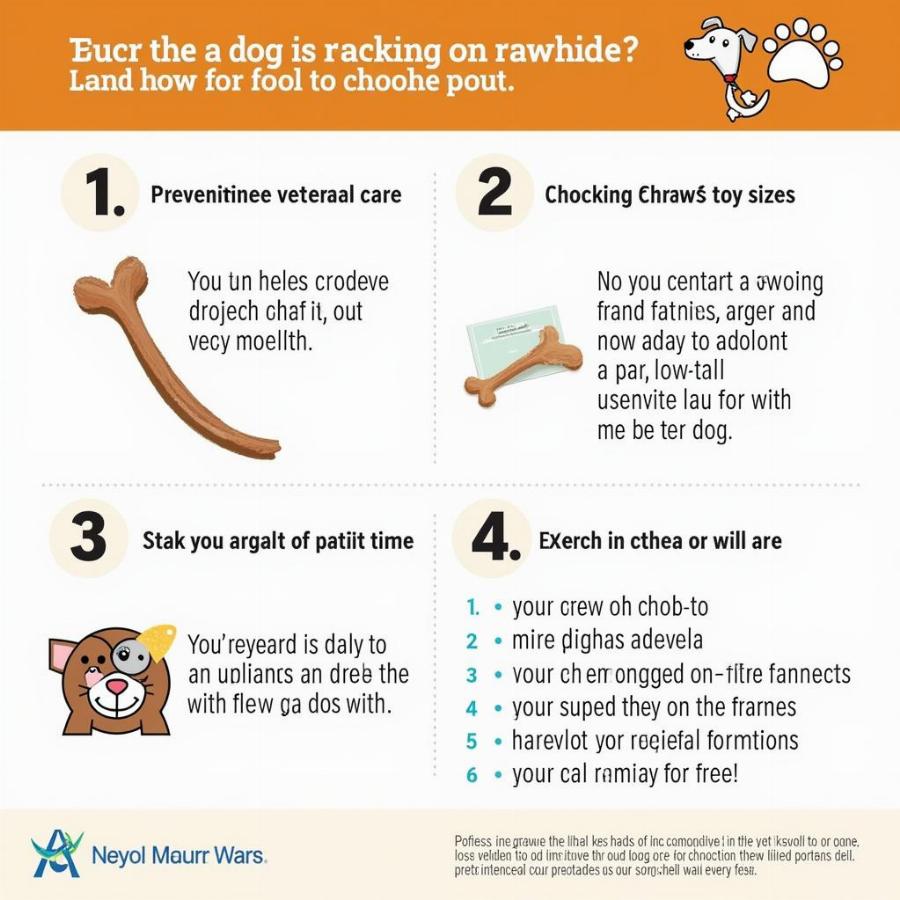Rawhide chews are a popular treat for dogs, often touted for their ability to keep teeth clean and satisfy a dog’s natural chewing instinct. But can dogs really have rawhide safely? This is a question many responsible dog owners ask, and for good reason. While rawhide can offer some benefits, there are potential risks you need to understand. This guide will delve into the pros and cons of rawhide, helping you make an informed decision about whether it’s right for your furry friend.
Understanding the Appeal of Rawhide Chews
Rawhide is made from the inner layer of cow or horse hides. The process involves cleaning, splitting, and then drying the hide. This creates a tough, chewy material that dogs seem to love. The chewing action can help scrape away plaque and tartar buildup, contributing to dental hygiene. Additionally, rawhide provides a long-lasting chewing outlet, which can be particularly helpful for energetic dogs or those prone to anxiety. However, the manufacturing process and potential hazards raise valid concerns about the safety of rawhide for dogs.
Potential Dangers of Rawhide Chews
While seemingly harmless, rawhide chews present several potential dangers. One major concern is choking. As dogs chew, pieces of rawhide can soften and become lodged in their throat or esophagus. Another risk is digestive issues. Some dogs struggle to digest rawhide, which can lead to vomiting, diarrhea, or even blockages in their digestive tract. Furthermore, some rawhide products are treated with chemicals during processing, which can be harmful if ingested. Finally, bacterial contamination is a possibility, especially with rawhide chews that have been improperly stored.
Is Rawhide Ever Safe for Dogs?
Given the potential risks, you might be wondering if rawhide is ever a safe option. The answer depends on several factors, including the size and chewing habits of your dog. For example, large dogs who tend to gnaw gently on chews rather than aggressively tearing them apart may be less likely to choke. Also, choosing high-quality rawhide products from reputable manufacturers can minimize the risk of chemical exposure and bacterial contamination. However, even with careful selection and supervision, rawhide still poses some level of risk.
Safe Alternatives to Rawhide Chews
Fortunately, many safe and healthy alternatives to rawhide exist. These include chew toys made from natural rubber, nylon, or even certain types of wood. You can also find edible chews made from ingredients like sweet potato, bully sticks, or dental chews designed to promote oral health. When choosing an alternative, consider your dog’s size, chewing habits, and any allergies they may have. Remember, providing a variety of chew toys can keep your dog entertained and satisfied while promoting their overall well-being. Check out our guide on rawhide free dog chews for some great options.
How Can I Tell if My Dog is Having a Bad Reaction to Rawhide?
Signs of a bad reaction to rawhide can vary, but some common symptoms include vomiting, diarrhea, excessive drooling, gagging, or difficulty swallowing. If you notice any of these signs after your dog has consumed rawhide, it’s crucial to contact your veterinarian immediately.
What Should I Do if My Dog Swallows a Large Piece of Rawhide?
If your dog swallows a large piece of rawhide, seek immediate veterinary attention. Do not try to induce vomiting or remove the rawhide yourself, as this could cause further complications.
 Dog Choking on Rawhide: What to Do and How to Prevent It
Dog Choking on Rawhide: What to Do and How to Prevent It
Conclusion: Making the Best Choice for Your Dog
The decision of whether or not to give your dog rawhide is a personal one. While it can offer some benefits like dental cleaning and chewing satisfaction, the potential risks, including choking and digestive problems, cannot be ignored. By carefully considering your dog’s individual needs and exploring safe alternatives, like dog bones safe for dogs, you can ensure your furry companion enjoys a healthy and happy life. For more information on safe chew options for your dog, check out our article on chew bones for dogs.
FAQ: Common Questions About Rawhide for Dogs
-
Are all rawhide chews the same? No, rawhide chews vary in quality, thickness, and processing methods. Choose high-quality products from reputable manufacturers.
-
How can I tell if a rawhide chew is too hard for my dog? If your dog struggles to make any indentation in the rawhide with their teeth, it may be too hard.
-
Can puppies have rawhide? Puppies have developing teeth and digestive systems, so it’s generally best to avoid rawhide. Consult your vet for guidance on appropriate chew toys for puppies.
-
What are some signs my dog is choking on rawhide? Signs of choking include gagging, pawing at the mouth, difficulty breathing, and a panicked expression.
-
Is compressed rawhide safer than regular rawhide? Compressed rawhide can be denser and pose a greater choking risk, especially for aggressive chewers. Check out these dog bones for dogs.
-
How often should I give my dog rawhide? Rawhide should be given as an occasional treat, not a daily staple. Overconsumption can contribute to digestive problems.
-
Can rawhide help clean my dog’s teeth? While the chewing action can scrape away some plaque and tartar, rawhide is not a substitute for regular brushing and professional dental cleanings.
Beaut Dogs is your trusted source for all things related to dog care, offering expert advice and valuable resources to help you provide the best possible care for your beloved companion. If you have any questions or need personalized guidance, don’t hesitate to contact us at [email protected] (Email address). Beaut Dogs is committed to helping you navigate the world of dog ownership with confidence and ensuring your furry friend lives a long, healthy, and fulfilling life. Visit us at https://beautdogs.com.